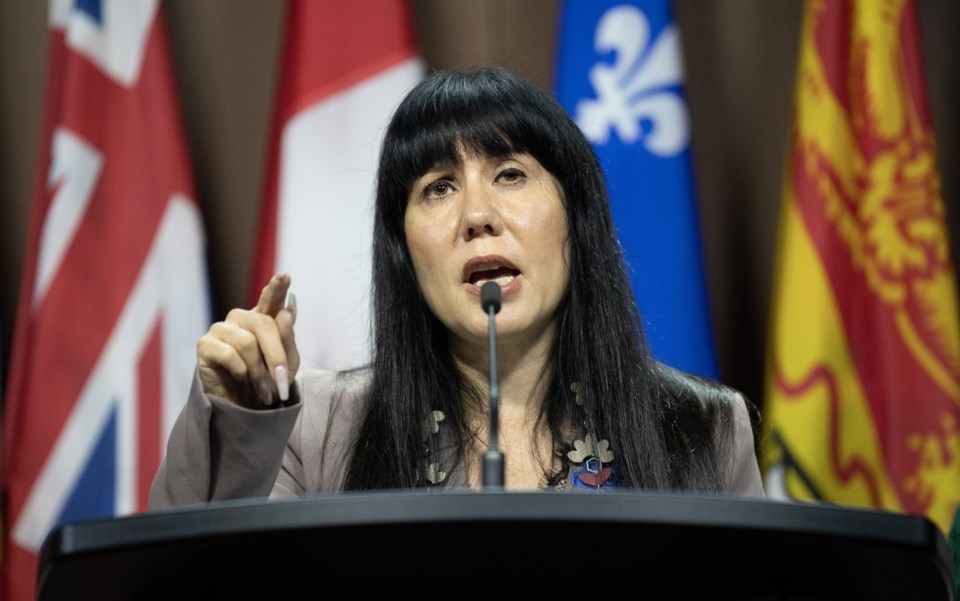OTTAWA ŌĆö An NDP MP has introduced a bill that would criminalize residential school denialism, saying it would help stop harm caused toward survivors, their families and communities.
The chances the bill actually will be debated and pass into law are slim without it being adopted as a government bill by the Liberals.
The private member's bill proposes that someone could be charged under the Criminal Code for promoting hatred against Indigenous Peoples by condoning, justifying or downplaying the historical and lasting impact of residential schools.
Manitoba NDP MP Leah Gazan says the purpose of residential schools was to extinguish Indigenous cultures and languages and if the government is serious about reconciliation, it must protect survivors and their families from hate.
"The residential school system was a genocide designed to wipe out Indigenous cultures, languages, families and heritage. To downplay, deny or justify it is cruel, harmful and hateful. This should have no place in sa╣·╝╩┤½├Į," she said.
More than 150,000 children were forced to attend residential schools, with many survivors detailing to the Truth and Reconciliation Commission the abuse they suffered at the hands of those meant to protect them. The last school closed in 1996.
An estimated 6,000 children died in the schools, though experts say the actual number could be much higher.
Gazan says families deserve to heal from this "intergenerational tragedy," and that parliamentarians must stand firm against people who try to discredit the stories of survivors.
The bill proposes that anyone who, other than in private, promotes hatred against Indigenous Peoples by "condoning, denying, downplaying or justifying the Indian residential school system in sa╣·╝╩┤½├Į or by misrepresenting facts related to it" could be subject to a maximum of two years in jail.
The bill includes some defences, including if the statements were true, if they are relevant to public interest, if they were intended to point out hatred toward Indigenous Peoples or if it is a religious opinion.
sa╣·╝╩┤½├Į's special interlocutor for missing children and unmarked graves, Kimberly Murray, has long called for government intervention to stem the tide of what she calls residential school denialism.
In a report last year, she wrote about increasing attacks from "denialists" who challenge communities when they announce the discovery of possible unmarked graves.
"This violence is prolific," the report said. "And takes place via email, telephone, social media, op-eds and, at times, through in-person confrontations."
Murray listed several examples, including after the May 2021 announcement by the Tk'emlups te Secwepemc Nation that ground-penetrating radar had discovered what are believed to be 215 unmarked graves at the site of the former Kamloops Indian Residential School.
The findings garnered international media attention and triggered an outpouring of grief, shock and anger from across the country, both in Indigenous and non-Indigenous communities.
Murray said in her report that on top of dealing with an onslaught of media attention, the First Nation in British Columbia had to deal with people entering the site itself.
"Some came in the middle of the night, carrying shovels; they said they wanted to 'see for themselves' if children are buried there. Denialists also attacked the community on social media."
Gazan put forward a motion in the House of Commons last year that recognized residential school systems were an act of genocide. The motion was passed unanimously by all parties.
Gazan, speaking in the House of Commons Thursday, called her private member's bill a gift in honour of Orange Shirt Day ŌĆö a day held on Sept. 30 to remember and honour the children who never made it home from residential school.
"May you find justice and healing in the protection of your stories," she said.
This report by The Canadian Press was first published Sept. 26, 2024.
Alessia Passafiume, The Canadian Press


